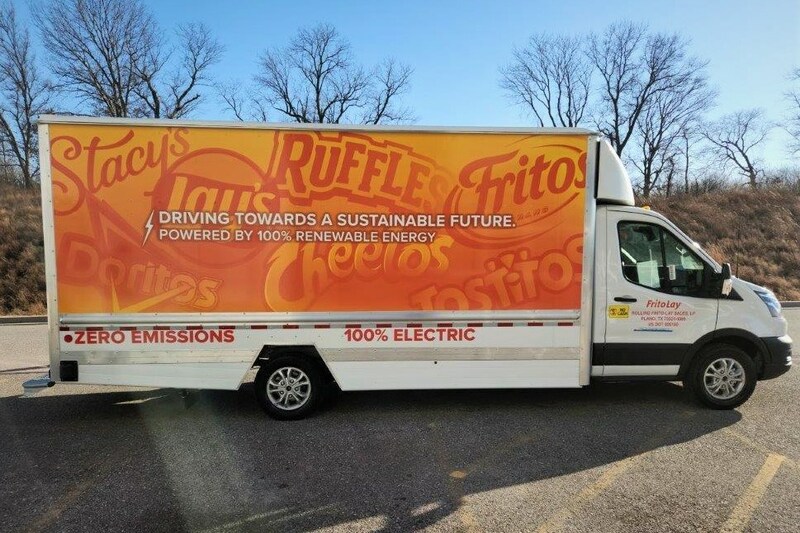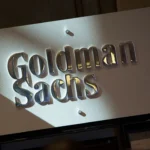Frito-Lay Expedites 2040 Net Zero Emissions Goal with Over 700 Electric Delivery Vehicles

America’s Snack Leader Shares Advancements Towards Its PepsiCo Positive Goals While Advancing its Mission to Create More Smiles and a Brighter Future with Every Bite
This Earth Month, Frito-Lay announced it will deploy over 700 electric delivery vehicles in the U.S. by the end of 2023. The vehicle deployments are expected to lower emissions by 7,052 metric tons of greenhouse gas emissions annually, equivalent to 1,533 passenger cars removed from the road. Paired with advancements in regenerative agriculture, water saving technology, packaging innovation and more, the move reflects the PepsiCo division’s significant progress toward its PepsiCo Positive sustainability goals.
“Our mission is to create more smiles and a brighter future with every bite,” said Steven Williams, PepsiCo Foods North America CEO. “As a collective of America’s most beloved brands, we have the unique opportunity to create a real impact by boldly innovating the way food is grown, made and shared.”
As sustainability becomes a core topic among consumers, Frito-Lay is using its iconic brands and its place at the table to create positive change, ensuring consumers don’t have to choose between taste and impact.
“Frito-Lay’s beloved brands have made millions of people smile for almost a century. We see it as a great opportunity to ensure our business contributes positively to the world,” said David Allen, vice president and chief sustainability officer, PepsiCo Foods North America. “From how our potatoes and corn are grown to how we make, transport, and sell our products, Frito-Lay will continue to leverage our scale to create real positive impact for people and our planet.”
Frito-Lay is instrumental in PepsiCo Positive (pep+), a strategic end-to-end transformation to drive sustainable long-term value and competitive advantage. Three pillars of pep+ drive action and industry-leading goals, including:
Positive Agriculture
As a food company, Frito-Lay is deeply rooted in regenerative agriculture processes that aim to improve soil conditions, reduce carbon emissions, improve watershed health and diversity, and strengthen farmer livelihoods in service of a more sustainable food system.
By the numbers, the company:
- Has a 3.5-million-acre farming footprint of agricultural land in the U.S., with a goal to use regenerative agriculture practices across its entire footprint (7 million acres globally across PepsiCo) by 2030
- Uses its agricultural supply chain to improve the livelihoods of more than 12,000 U.S. farmers
- 100% of the corn and potatoes (1.5 million metric tons) used to make Frito-Lay products in North America are sustainably sourced, adhering to and providing assurances for the social, environmental, and economic principles of our Sustainable Farming Program (SFP)
See related article: Frito-Lay and Schneider Complete EV Shipment in Continued Effort to Decarbonize Supply Chain
Positive Value Chain
Introducing zero-and near-zero emission vehicles across the nation marks a key step in achieving the pep+ net-zero emissions goal by 2040.
“The introduction of electric vehicles throughout our owned fleet and that of our partners is in direct support of our commitment to building a circular and inclusive value chain,” said Laura Maxwell, senior vice president of supply chain at PepsiCo Foods North America. “At our Modesto, California, plant, we have reduced our greenhouse gas emissions by 91% from direct fleet operations, and we look forward to scaling that as we add electric vehicles throughout the country.”
Beyond electric vehicles, Frito-Lay is also marking progress on renewable energy and water saving in pursuit of a sustainable value chain through:
- Improved emissions from zero- and near-zero emission technologies at the Frito-Lay manufacturing site in Modesto, Calif.
- A new electric fleet to serve the Dallas-Fort Worth area
- First-of-its-kind third-party transportation shipping with Schneider National Inc., marking Frito-Lay as the first to contract transport on Schneider’s growing fleet of Freightliner eCascadia battery-electric trucks in southern California
- Achieved 100 percent renewable electricity in all of its U.S. plants, offices and distribution centers
- Recycling 75 percent of process water at the Frito-Lay Casa Grande, Ariz. manufacturing facility
Positive Choices By purposely incorporating more diverse ingredients, sister companies Frito-Lay and The Quaker Oats Company are making choices that deliver nutritional benefits. This includes prioritizing chickpeas, plant-based proteins and whole grains, such as:
- Off The Eaten Path®, which are made with rice and real veggies like peas, chickpeas or black beans.
- Our Bare® Snacks portfolio which are real fruits and coconut snacks, baked to crunchy perfection.
- SunChips® Black Bean (Spicy Jalapeno and Southwestern Queso flavors) chips, made with whole grains and real cooked black beans.
- Quaker® Oats offer a variety of 100% whole grain oat hot cereal options that provide whole grains and a good source of fiber to consumers.
- Quaker® offers a variety of ready to eat cereal options that provide 24 to 46 grams of whole grains per serving such as Life Cereal, Quaker Simply Granola, Quaker Protein Granola and Quaker Puffed Granola.
- Quaker® Rice Thins combine decadent flavors of salted caramel or cocoa in a popped corn and whole grain brown rice with 14 to 18 grams of whole grain per serving.
- PopCorners® is an air-popped, never fried snack that combines bold flavors with wholesome ingredients for a flavor-packed crunch.
- Natuchips™ made from real sliced plantains
As another step along its pep+ journey, Frito-Lay and Quaker together are designing 100% of packaging to be recyclable, compostable, biodegradable or reusable by 2025. The company opened a new industry-leading Greenhouse Learning Center earlier this month that will test the biodegradation properties of packaging materials in different environments.










